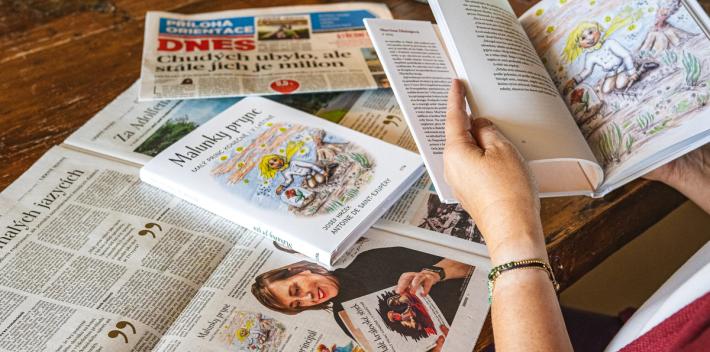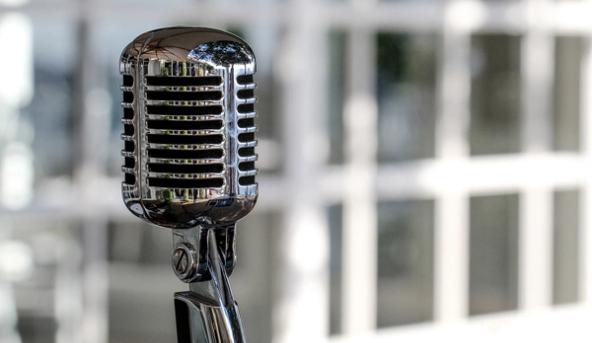
Malunky prync ve víkendové MF DNES
Přečtěte si článek o edici Malého prince v českých a moravských nářečí, za kterými stojí Martina Dlabajová. Vyšel ve víkendové příloze MF DNES - Magazín Víkend DNES.

You are both co-chairs of the Intergroup on Small and Medium-Sized Enterprises at the European Parliament. Can you explain the role of this intergroup and what it brings to SMEs across Europe?
Angelika Winzig: Since the European Parliament does not have a Committee solely focusing on SMEs issues, the SME Intergroup serves as a joint platform for MEPs and stakeholders with an interest in fostering and ensuring a business-friendly environment, in which SMEs can thrive. Thereby, the Intergroup acts as an inter-institutional dialogue forum for SMEs issues with members from different political groups and parties in the European Parliament. The goal is to put SMEs issues at the forefront of the minds of the Parliamentarians and stakeholders and shed a light on what the SMEs need and what challenges they face. Because unfortunately more often than not, this is neglected in the policy making process, especially when you look at new proposals by the Commission. Instead of reducing red tape, the new laws create additional administrative hurdles. Through discussion and awareness raising, we want to give SMEs a strong voice in the policy-making process.
Martina Dlabajová: I am extremely proud of what SME Intergroup has achieved so far. We have made it clear where the EU’s priority should be in this difficult period of time. And the one is SMEs. The SME Intergroup is very active, we meet regularly and listen to what SMEs need. We work directly with entrepreneurs and their associationsin finding and eliminating problems in existing and proposed European legislation. We spend a lot of time assessing every proposal we work on in the European Parliament from the perspective of SMEs. We always wonder what it will bring them and whether it is really necessary. By default, it should work like this everywhere, but unfortunately, as Angelika says, legislative proposals that are completely detached from reality are still being created.
Eurostat recently published updated statistics on business bankruptcies and new registrations. We saw that compared to pre-pandemic Q4 2019 the number of bankruptcies in the accommodation and food services sector in Q4 2022 increased by 97.7%. SMEs are a driver of economic growth and job creation. How to ensure that Europe meets their needs?
Angelika Winzig: SMEs had to face a number of enormous challenges in the past few years and the COVID pandemic has hit the hospitality sector especially hard. SMEs suffered given their size, scarce resources and limited cash flows and we will continue to see the effects for months to come. Besides facilitating the access to financing, including alternative forms of financing, for SME, I see the fight against bureaucracy as paramount. There are proposal and strategies on the table, focusing on SMEs, Better Regulation etc. but words are not enough, we need more concrete action. If we do not focus on strengthening our companies and thereby our competitiveness we will lose the global race.
99% of companies in the hospitality and tourism sector are SMEs (90% of them being micro-enterprises). Companies are struggling today with the energy crisis, shortages in labour forces and increasing costs. Yet, the hospitality business is also looking at investing in its future. Do you have a concrete message you would like to share with our members?
Martina Dlabajová: We are fully aware of the challenges the hospitality and tourism sector is currently facing. We appreciate the importance of the sector as a major contributor to the European economy, providing job opportunities and driving growth and innovation. The EU has introduced several measures to support the sector. These include financial assistance, tax incentives and regulatory relief for SMEs. We also invest in initiatives that support sustainable tourism, improve digitalisation and encourage innovation in the sector.
We encourage you to take advantage of the support provided by the EU. Invest in your future by adopting sustainable practices, improving your digital capabilities and exploring new markets and business models. The SME Intergroup is there for you and together we can create a vibrant and resilient hospitality and tourism sector.
Martina Dlabajová was born on July 26, 1976, in Zlin, the Czech Republic. Since 2014 she has been a Member of the European Parliament. In 2019 she became the Renew Europe Coordinator in the Committee on Industry, Research and Energy, the Co-Chair of the SME Intergroup and the Chair of Renew Europe SME Taskforce. Before entering politics, she founded and managed several companies in the Czech Republic, Slovak Republic and Italy and she was the President of the Regional Chamber of Commerce of the Zlin Region, the Czech Republic (2012 – 2014). In 2019, she received the Gold Badge of the Italian-Czech Chamber of Commerce and Industry (Camic) for contribution to the development of economic and business relations between her country and Italy. In 2020, the President of the Italian Republic awarded her the title of Knight of the Order of the Star of Italy (Cavaliere dell’Ordine della Stella d’Italia) for her outstanding contribution to the Czech-Italian relations.
Angelika Winzig was born on May 9, 1963 in Attnang-Puchheim, Upper Austria. Since 2019 she has served as a Member of the European Parliament and is the Head of the Austrian EPP delegation. She is a full member of the Budget and Budgetary Control Committees and a substitute member in the Industry, Energy & Research Committee as well as International Trade and Women’s Rights and Gender Equality. She is also co-chairing the parliamentary Intergroup on Small and Medium Sized Enterprises together with her colleague Martina Dlabajová. Before her time in Brussels she served as a Member of the Austrian National Council focusing on budget. She is also the deputy leader of the parliamentary group of the Austrian People’s Party (ÖVP).
The interview was published in HOTREC Hospitality Europe Live from Brussels Newsletter.